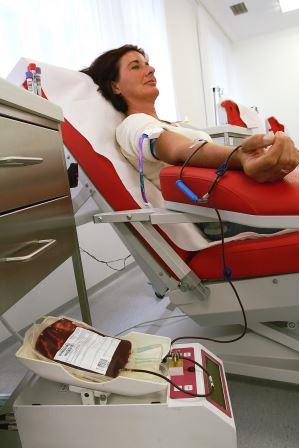Blood donation is a fairly simple procedure that could save a life, so be sure to sign up and donate some blood.
27 August 2013
| Last updated on 3 January 2018
The Central Blood Bank-Kingdom of Bahrain(CBB) with its team of highly trained professional staff offers its congenial and caring services to an increasing number of conscientious blood donors who know that this is the most precious gift that can be given by one human being to a fellow human.

A large number of blood-donation camps averaging 70 per year are organised each year with the cooperation of numerous socially responsible organisations and societies. Consequently about eleven thousand units are processed yearly – and the number is rising. Other health-care centers, Governmental and private, frequently use blood products and laboratory services of SMC, as this is the apex blood bank in the country as well as the largest. Hemapheresis is also a treatment modality that is offered by the blood bank and is finding increasing use in clinical medicine. Each donation, or unit, is tested whether the donor has given blood once or multiple times. Since CBB only accepts donations from unpaid volunteer donors, most blood is acceptable to transfuse. More than 97% of the blood collected by CBB passes all the tests. The CBB follows the International Standard and Regulation of the American Association of Blood
Banks (AABB) and the International Society of Blood Transfusion (ISBT). These agencies set the standards for testing performed at CBB. If a donation is found unsuitable for transfusion to another person, CBB destroys the donated blood. Section also notify donors who have unsuitable test results.
Donors with positive test results for blood-borne infections must not give blood again. Unsuitable units are not necessarily infectious. Because screening tests are so sensitive, some blood may react to tests, but be found negative when confirmatory tests are performed. These are called "false-positive" results. For the safety of the patient, CBB will not transfuse any unsuitable donations. "False-positive" units, as well as confirmed positive units, are discarded.
Donors results are confidential. Kingdom of Bahrain laws require CBB to report the names of donors found positive for specific tests to the Department of Public Health. This information is treated confidentially; however, it may be used for contact tracing by public health authorities. This information also provides statistical data for determining infection rates in the donor population.
Donor Information
Central Blood Bank provides Salmaniya Medical Complex and other Governmental and Private Hospitals patients with the vast majority of their transfusion needs. Most of our donors are volunteers blood donors who have been giving blood at our Center for years. Due to the generous support of these dedicated donors, we never needed to import blood from outside sources. All blood donors are important, but if you are type O or AB, you are special because type O negative red blood cells and type AB plasma can be transfused to any patient. Your donations are VITAL - please donate as often as you can, every 90 days for red blood cells. Having blood immediately available when it is needed may help save many lives.

Facts About Blood and Your Blood Donation
• The average adult has 10 to 12 pints of blood in their body;
• Your one donation can save up to 3 lives;
• No valid substitute for blood - so when you need it, the only possible way to get it is from other human beings;
• Any day, these facts could mean the difference between life and death;
• You cannot get AIDS or any other disease by giving blood;
• You can give whole blood every 90 days, single platelets every 48 hours;
Autologous Donations: may be made by patients for their own use at a future time. Because autologous blood is the safest type of transfusion to receive, we also provide this collection service for patients scheduled for elective surgery. Autologous donations, however, must be scheduled in advance and require physician approval.
Directed Donation: may be donated by specified persons, generally family members or friends, for use by a specific individual. Directed donors must meet the same screening requirements as routine transfusion donors. Directed donations have not been shown to be safer, and may potentially be less safe, than donations from random volunteer donors who have donated many times in the past.
What to expect when you donate:
1. Registration: Confidential information is gathered which will positively identify you and each of your donations.
2. Interview: A medical history is taken in a private booth. You will be asked some very personal questions. Please do not be offended. We are required to ask them.
3. Mini-Physical: Current pulse, blood pressure, and hemoglobin levels are determined.
NOTE: Information from the interview and the physical is designed to make sure donating will not adversely affect you or any recipient of your blood. Some health conditions or medications may require a temporary deferral from donating.
4. Phlebotomy: You will be seated in a reclining donor chair. A tourniquet will be applied to your arm and a suitable vein located. The site will be cleaned with an antiseptic scrub containing iodine. (Please tell us if you are allergic to iodine as we have alternate methods.) A collection needle will be gently inserted into your vein and the blood collected in a sterile attached bag for 5 to 15 minutes. When the donation is completed, you will be asked to hold a gauze over the site while keeping your arm elevated. Finally a pressure bandage will be applied to the site and you may rest and enjoy some refreshments.
What Blood Tests Are Done:
1. ABO and Rh blood type along with tests for unexpected blood group antibodies.
2. Tests for antibodies, which may indicate past or present exposure to:
o HIV, associated with AIDS
o HBsAg (hepatitis B)
o Anti HBc (hepatitis B core antibody)
o HCV (hepatitis C)
o Syphilis
Donors with positive tests will be notified and placed on the deferral roster. In some cases, further testing is required to confirm the results obtained. Therefore, notification may take several weeks.
Care After Donating
1. Relax and enjoy the refreshments provided. You normally have 10 to 12 pints of blood in your body and have just donated about one. It will only take a few minutes before your body adjusts to the change. The fluid volume will be replaced in a few days, but the red cells will take several weeks. Remember, we have not taken enough to hurt you.
2. If you smoke, do not do so for at least 30 minutes. Doing so before then may make you lightheaded.
3. Be careful of alcoholic beverages. If you do drink any, the effect will be intensified because of your donation.
4. Drink plenty of non-alcoholic beverages. The more you drink, the faster the fluid volume of your blood will be replaced. We recommend 1/2 to 1 extra gallon in the next 24 hours.
5. Do not remove the bandage over the site for at least 4 hours. This gives it time to heal. If you notice bleeding before then, please raise your arm up and apply a new bandage just as was done after your donation.
6. Avoid strenuous activity for the rest of the day. Do not push, pull, or lift any objects greater than 25 pounds.
Important Information
1. You cannot get any disease from donating blood. The needles and bags we use are sterile, have never been used before, and will never be used again.
2. No one can obtain your test results without written authorization from you.
3. The Central Blood Bank staff will notify you of your results if indicated. You also permit us to notify the Public Health Directorate (Communicable Disease Section) of your identity if the test for hepatitis B (HBsAg), Hepatitis C, or HIV is confirmed positive.
4. The majority of donors do not experience any unpleasant effects from donating. Rarely, however, reactions do occur. If you have any unexpected reactions before, during, or after the phlebotomy, please tell us. Risks and/or complications associated with donating include the following conditions most of which are quite rare:
o Rapid pulse rate
o Dizziness or light headache
o Itching at the site from an allergy to iodine
o Bruising (hematomas), pain or nerve damage at the site
o Nausea and/or vomiting
o Convulsions
5. Remember, if you are newly infected, you can pass a disease but still test negative. So in order to protect others, donating just to obtain infectious disease results is prohibited. If you want to obtain infectious disease testing, please arrange that through your Health Center physician:
Basic Requirements
o Be in generally good health and feeling well.
o Be at least 18 years of age; upper age 60.
o Weigh at least 110 pounds (50kg).
o Pulse: 80 to 100 beats/min and regular.
o Temperature: Should not exceed 99.5 (37.5c)
o Skin: the venipuncture site should be free of any lesion or scar of needle pricks indicative of addiction to narcotics or frequent Blood donation (as in the case of professional Blood donors).
For more information please go to http://www.moh.gov.bh/EN/healthEstablishment/Establishments/SMC/BloodDonation.aspx?print=true





















































































